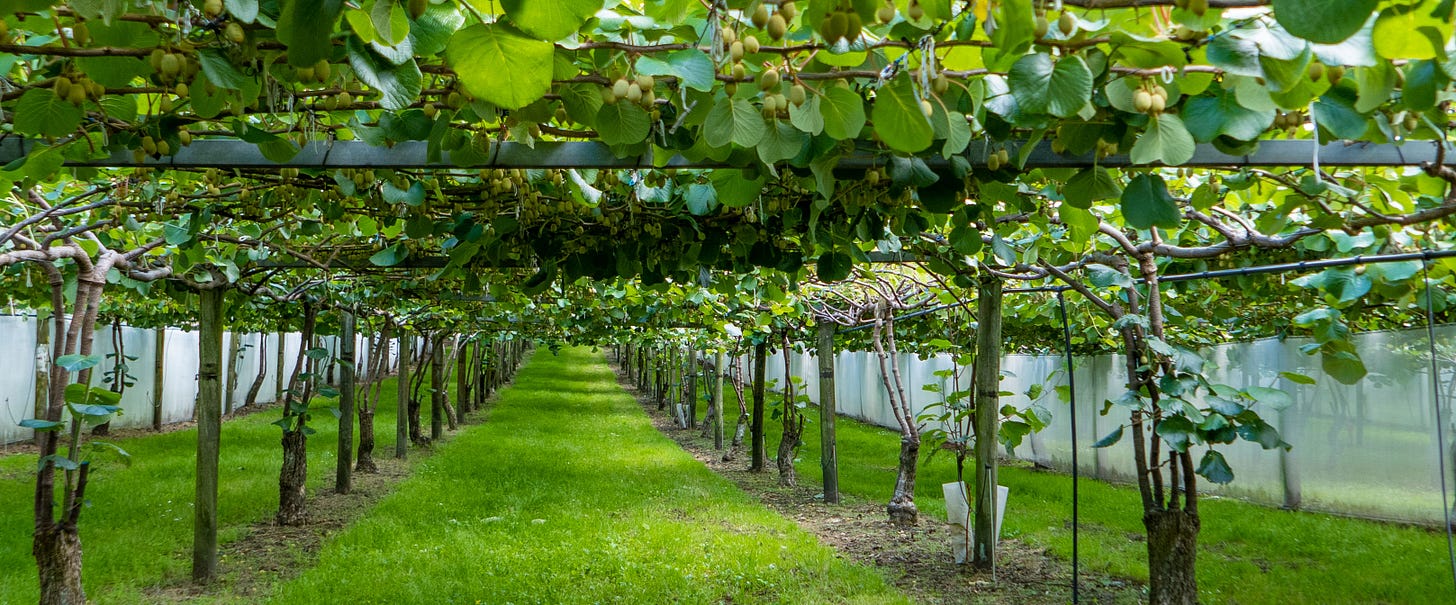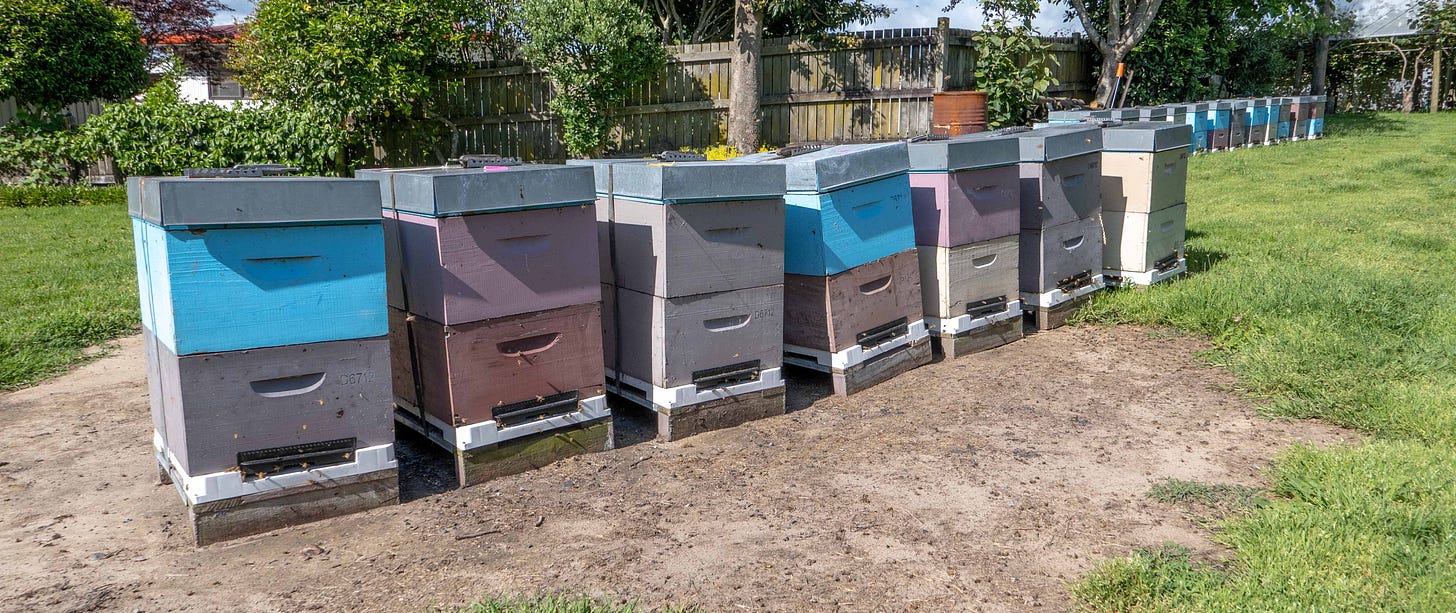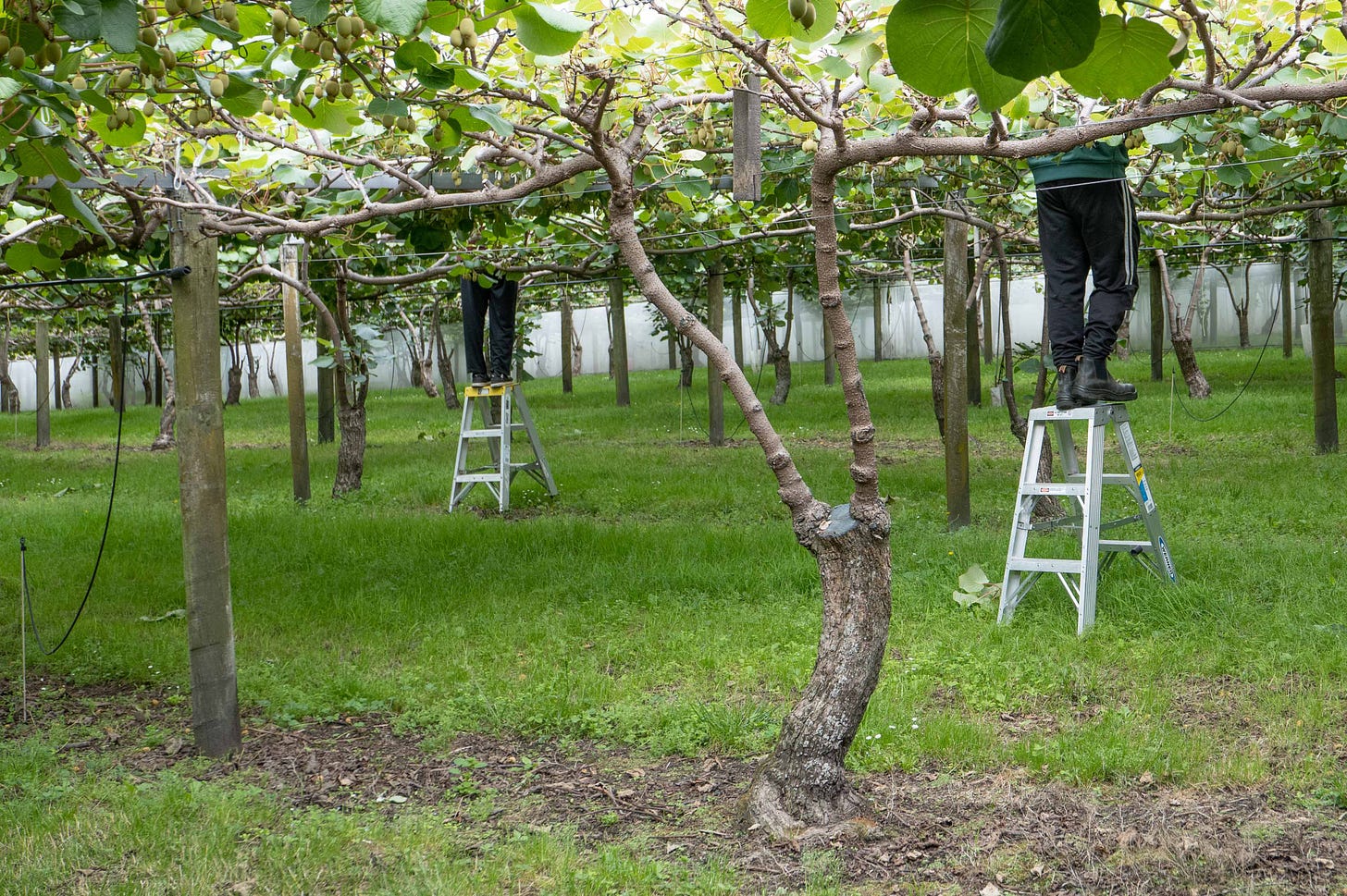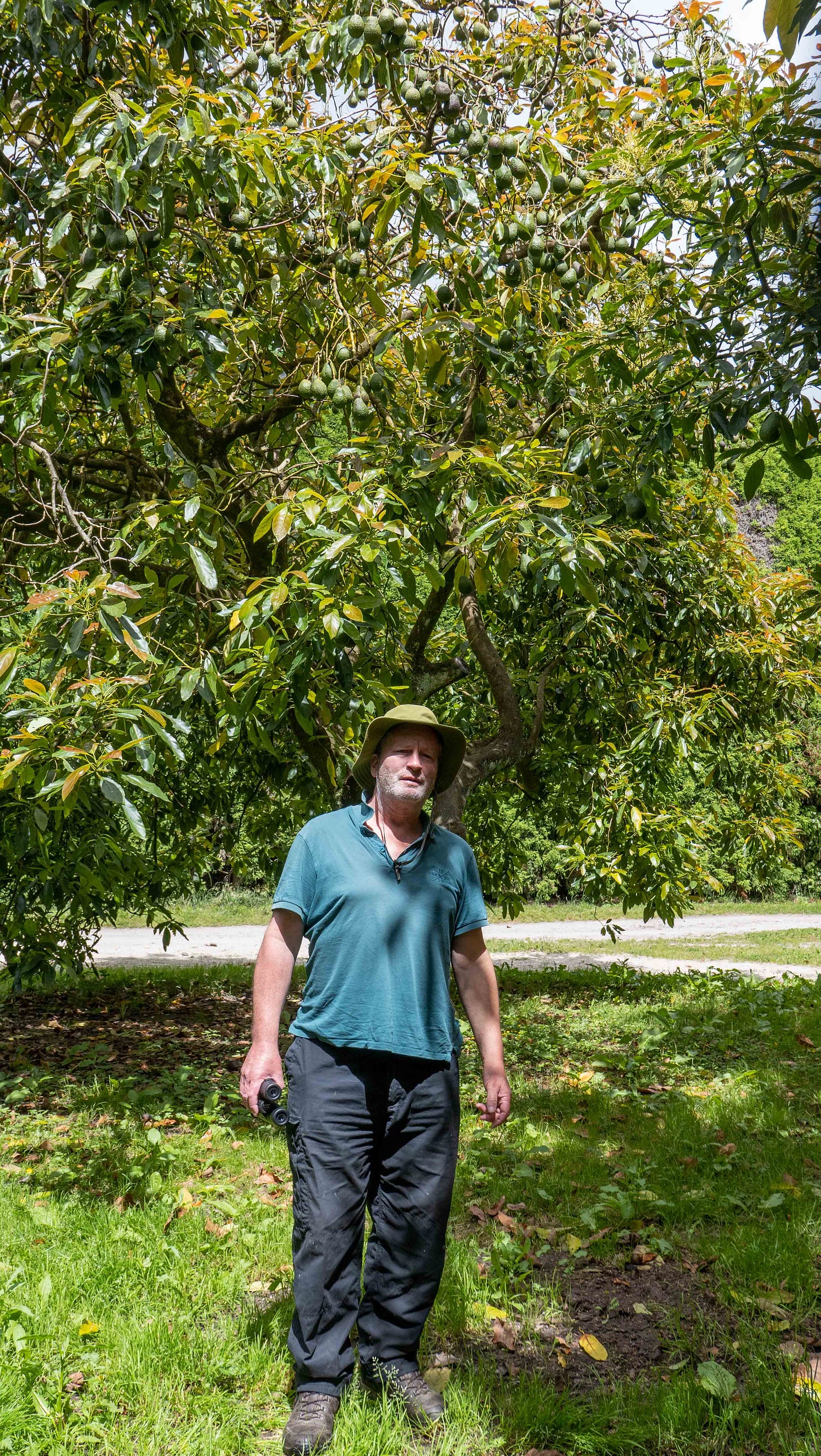On the buses
A 4am start heralded the start of our journey south. We threw ourselves out of bed – there’s no other way to do it if you’re getting up that early – and hopped into the car for the first leg of the journey.
We had already (at great cost) been caught out with the ever-changing speed limits in New Zealand, so Mike was careful all the way back to Kerikeri. He also had to concentrate on avoiding the potholes. When we were warned about New Zealand potholes big enough for a car to fall into, we thought it was an exaggeration – until we reached the Far North. There are many places where one side of the road has collapsed. In some places, the road has a significant step where it has dropped across the whole width. These hazards are usually easy to spot, with cones, reduced speed limits or even contraflow systems in place, but some are not. They are hard enough to see during the day, let alone in the hours of darkness.
Our timing worked perfectly for catching the bus. When it arrived, we thought that things had got even better. It had seats that folded flat into beds – just what we needed after such an early start.
A loudspeaker crackled into life. ‘Whoever that is folding the beds out, this is a full service. You need to keep the seats upright.’ The driver must have cameras on the upper deck…
Several hours later, we arrived in Auckland for a quick turnaround to catch the Tauranga bus, which was also too full to stretch out and sleep. One of the seats opposite us was occupied by a young woman, and during the journey, a burly man sat next to her.
After a while, Mike noticed that he was manspreading1, forcing the woman to sit with her legs to one side to avoid touching him.
‘Excuse me, mate. Would you move your leg so it’s not taking over your neighbour’s space, please?’ Mike expected that his request would be met with an apology and immediate repositioning. Instead, it was met with a steely stare.
‘C’mon, mate. You’re encroaching on her legroom. Just move your leg back to your side so she has some space.’ The burly man continued to stare at Mike and spread his legs even further. Asking was clearly not going to work.
Mike looked at the woman. ‘Here, I’ll swap with you.’
She came to sit next to me, and Mike sat in her seat. Now there were two burly men sitting next to each other, jostling for space. Burly Man did not move his legs.
‘Don’t touch me.’
‘Well, it’s a bit difficult not to with you sitting like that.’
Throughout the next half an hour, tensions escalated, then someone would say or do something that made us all laugh, before the cycle started again.
Eventually, having made no progress, and with the tension beginning to mount again, Mike sought the support of the driver. At the next stop, the driver came upstairs and told Burly Man in no uncertain terms that he was to behave himself. If he wanted to stay on the bus, he must sit downstairs where the driver could keep an eye on him. Luckily, he complied.
Thank goodness for feminists like Mike, who are prepared to challenge other men when they are behaving unreasonably. I would love to have seen the young woman stand up for herself, but understand why she did not. Physically, it was nowhere close to an even match, and she could have found herself in a tricky situation had she said something that he didn’t like.
Papamoa & Te Puke – home of the kiwi fruit
In Papamoa, we were once again staying with members of the local Rotary club, this time in a house by the beach. A swim in the Pacific Ocean was just what we needed as an antidote to the stressful bus journey, even though the waves were what our host called ‘dumpy’. As in, they dump you onto the sand as they break. Mike developed a technique to avoid being dumped, which made getting in and out a little more gainly. Beyond the surf, we swam and floated on the undulating waves, in water that was much warmer (or at least less cold) than that at home.
The following day, after Mike gave a presentation to the Papamoa Te Papa Rotary Club (towns here often have more than one club), we couldn’t resist spending more time on the beach, admiring shells, walking and swimming.
One benefit of homestays is that you never know where your conversations might take you when you meet someone new. On this occasion, our Rotarian host’s husband manages kiwi orchards, and he offered to show us around one of them.
I love kiwi fruit but had never seen a kiwi vine before this trip. I thought that they didn’t grow in the UK, but the Royal Horticultural Society says otherwise. It seems they need a sheltered spot, so our windy garden on the Welsh coast is not likely to be a good choice!
Before setting off, Larry gave us a rundown of the growing process. I had no idea how complex and labour-intensive it is.
The vines are grown up and over a structure that is just above head height, forming a canopy. Each branch needs to be carefully spaced, and the shoots in the canopy must be controlled to stop it from forming a dense mat. The fruit grows on stems that are in their second or third season of growth, which means that every year, old stems need to be removed and new ones tied in to the canopy framework.
It’s also important to have the right number and spacing of male plants. As they don’t produce fruit themselves, you need just enough for the flowers to pollinate the female plants, and no more.
When the vines are in bloom, hives are brought in so the bees will get to work pollinating the flowers. Even that is a science, as the bees need to be ready to look for pollen rather than nectar, the latter of which the kiwi vines have little of.
Once the fruits have set, they are thinned to a prescribed number per square metre and per leaf on the stem to maximise the quality and yield. At just the right time, the vines are girdled2 and some of the leaves are removed. This has the effect of sweetening the fruit. The vines are then harvested by hand to ensure the best quality.
During the whole process, there’s a succession of things that might attack the vines. They are treated for viruses and bacteria, and to remove caterpillars. When it’s raining, work in the orchards has to stop to avoid spreading disease. And when it hails, the entire crop can be lost. Climate breakdown is making the weather less predictable for growers, and they are having to take additional steps in the production process. For example, a defoliant is sprayed on the leaves during the winter, as it often does not get cold enough for the leaves to drop. (The right number of leaves protects the buds from severe cold, but too many stops them from getting cold enough to set into fruit.) Larry assured us that the chemicals used were all ‘soft’ chemicals that are fairly harmless. Nevertheless, it did leave us wondering about the environmental costs versus the productivity gains of these interventions.
‘You’ll need some warm clothes with you,’ warned our host. I threw my waterproof jacket and a fleece into the vehicle, just in case. It was warm near the coast, but the orchard was higher up the hills, and it was distinctly cooler when we arrived. I was glad of the advice.
Larry showed us around the orchard, demonstrating the techniques he had already described. Seven hives had been delivered the previous day, and the bees were busy. When they left the hives, their legs were bare. As they returned, they were carrying white balls of pollen; they were clearly doing their job.
A profusion of creamy white flowers hung down just above our heads as we walked along the row of vines. The bees were buzzing loudly as they went about their business, and the workers were chatting quietly as they pruned and thinned the fruit. Some greeted us as we arrived. Others were up on small stepladders, just their legs visible, inspecting and pruning the mat of vegetation that formed the canopy.
Kiwi orchards are often planted next to avocado orchards. The trees here bore little resemblance to the weedy palmate things that I have occasionally managed to grow from an avocado stone. They reminded me of pear trees, with the fruit dripping from the branches in a similar way.
Kiwi fruit are not currently in season, but avocados are ten-a-penny right now, so I have been indulging my love of them, squishing their ripe flesh into sandwiches or adding them to salads at every opportunity.
We have a real problem in the UK with unripe avocados sitting on the window ledge, doing nothing for days and then suddenly turning soft and black. I don’t know how to manage avocado ripening any better (do you?), but I do now know how to ripen a kiwi fruit. If that’s something you’re itching to find out, please let me know in the comments.
I hope you’ve enjoyed this week’s instalment. Next time, we’re camping up in the hills. The phrase, ‘It was the best of times, it was the worst of times’ springs to mind. See you next week!
Julia
Sitting with his legs wide, taking up more than his share of the space.
Girdling creates a small break in the bark all the way around the vine, to temporarily stop sugars from flowing into the roots.








